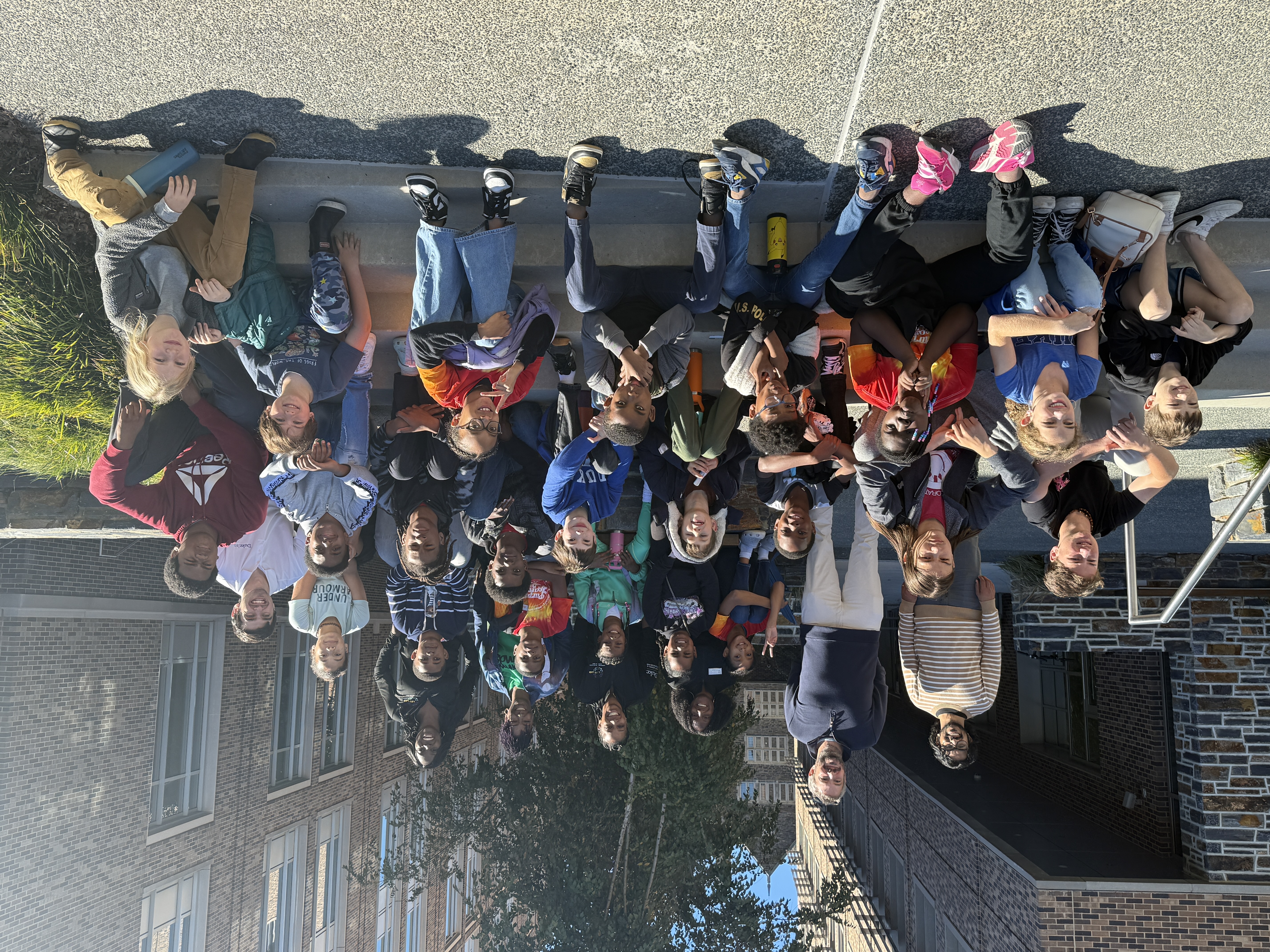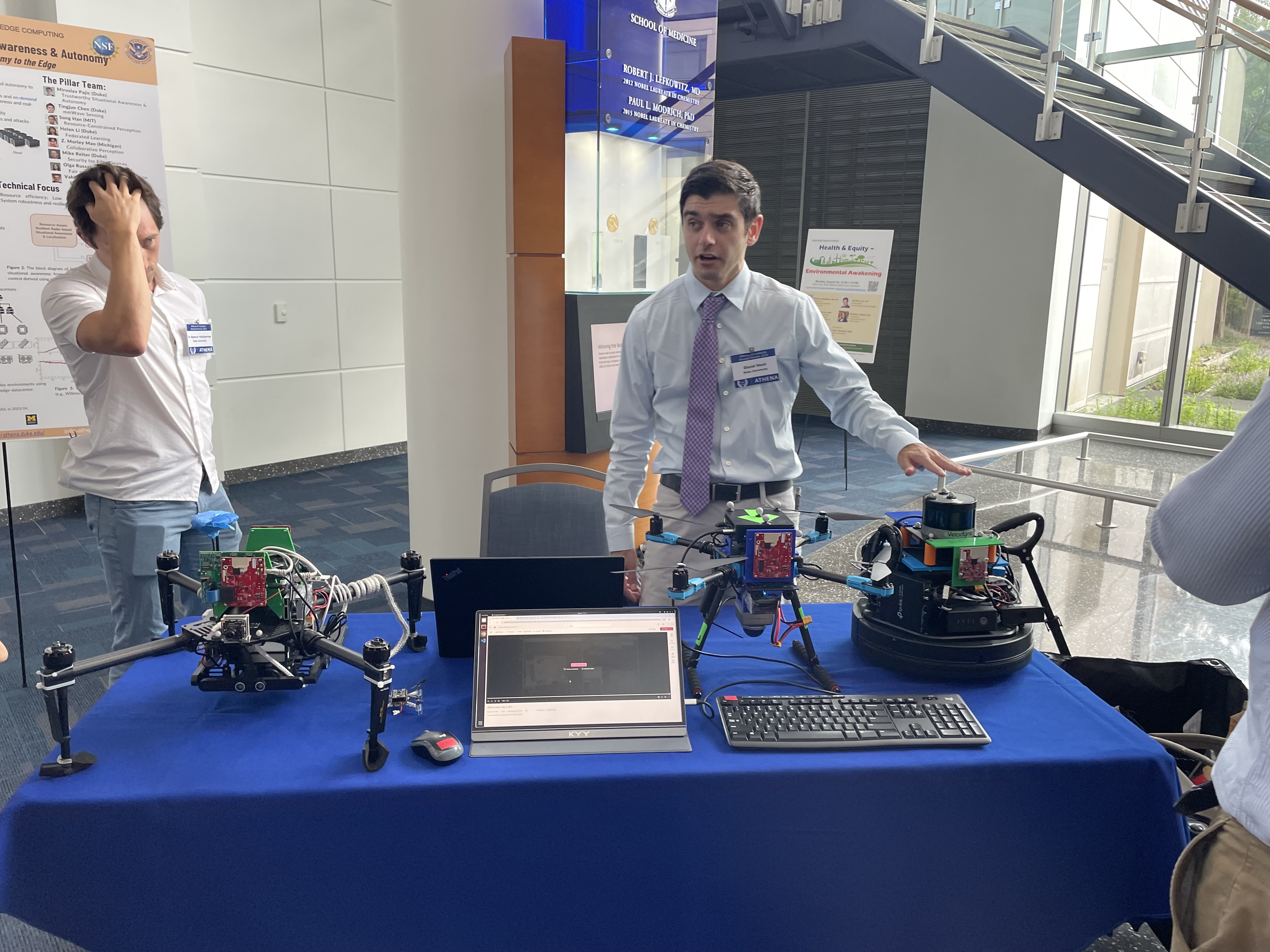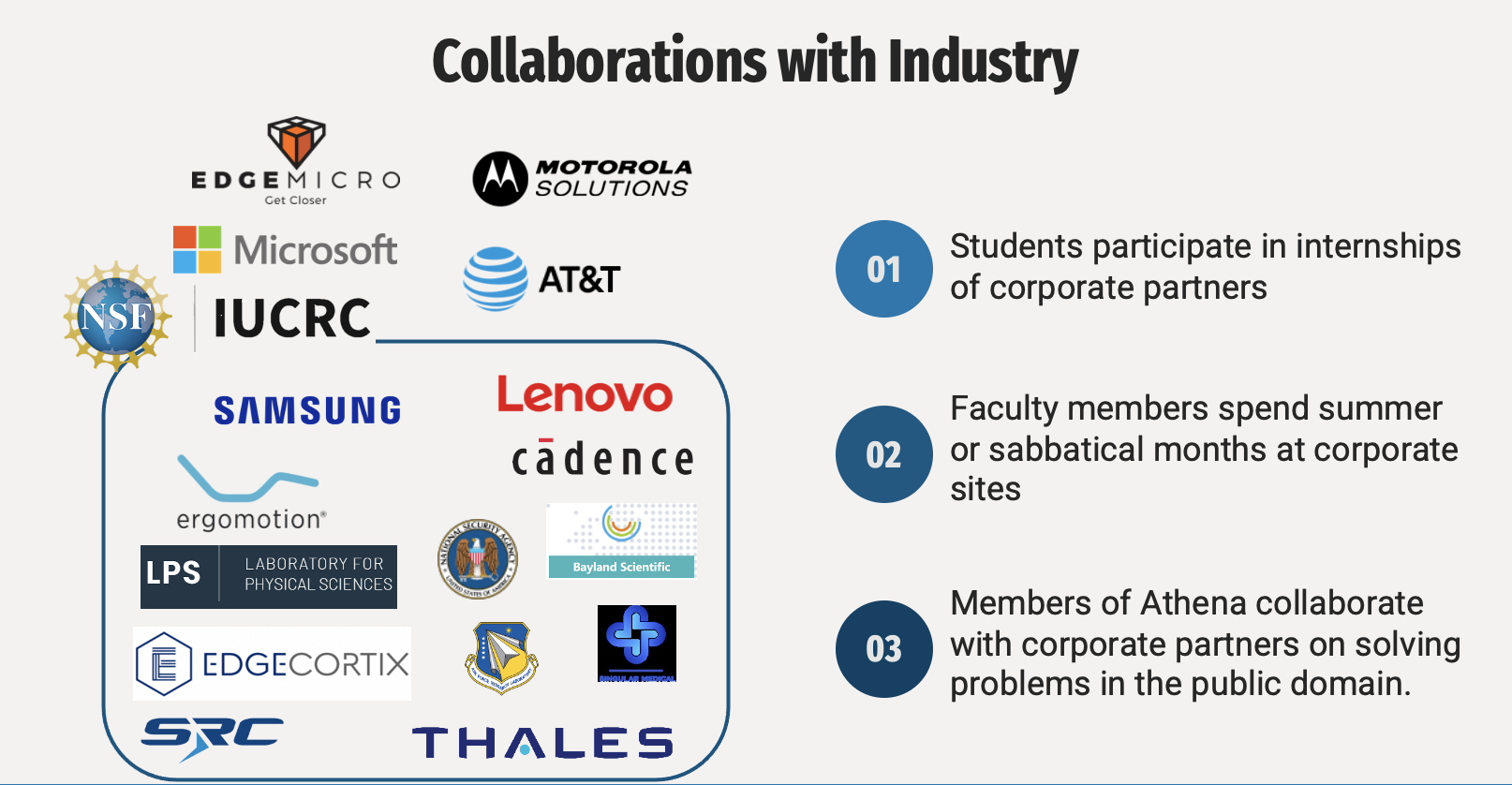U.S. National Science Foundation AI Institute for Edge Computing Leveraging Next Generation Networks is committed to educating and developing our workforce, cultivating the next generation of technical leaders who will ensure the ethical and fair use of AI. We work with schools, districts, and other nonprofit partners to bring evidence-based activities to students all over the east coast. Together with its industrial and government partners, Athena will spearhead collaboration and knowledge transfer to maximize the translation of AI-empowered edge computing into new business opportunities.

- K-12 Activities
Athena partners with non-profit organizations to conduct activities for aspiring STEM students. Our year-round programs include Community Code with Knox Street Studios, Summer in STEM with Inspiring Minds, Academic Year Research with North Carolina A&T Early STEM College, and TechArts and Crafts with the Whitaker Project. We've reached over 900 students with more than 250 contact hours. Contact dukeliftlab@duke.edu if you're interested in partnering with us. Upcoming events are announced on LinkedIn.
- Summer Research Opportunities
The Athena REU will run 6 projects during summer 2026. Specific dates will be arranged by your host.
Deadline for applications: February 6, 2026
First Round of Applications Reviewed: February 27, 2026
Student Notifications: Week of March 2, 2026Eligibility
- Undergraduate students majoring in a Science, Technology, Engineering and/or Mathematics (STEM) discipline
- US citizens or permanent residents
- Undergraduate in good academic standing
Student Application: https://duke.is/athena2026
Project Descriptions
Project 1
Daniel Limbrick
North Carolina A&T
Students will learn how to evaluate the fault response of a RISC-V microcontroller while running TinyML applications to understand which bits are most vulnerable. Experience in fault injection (e.g., code emulating upsets, GDB-based, HDL methods), TinyML models (e.g., mobilenet), and hardware modeling and verification (SystemVerilog) will be gained.
(Sophomores - Seniors; Dates: 6/1/2026 - 7/26/2026)
Project 2
Tingjun Chen
Duke University
The project will focus on the development and testing of agentic AI workflows for emerging IoT systems and applications, building on top of our recent work on MCP-based IoT systems design and control (https://arxiv.org/abs/2510.01260). The student will also have the opportunity to deploy real-world IoT applications that embed intelligence.
(Juniors/Seniors; Dates: 6/1/2026 - 7/26/2026)
Project 3
Suman Banerjee
University of Wisconsin-Madison
The goal of the project is to contribute towards hardware or software design for a cognitive assistant, that leverages various forms of sensing, interfacing with language models, and implementing them in various embedded platforms.
(Sophomores - Seniors; Dates: 5/15/2026 - 7/26/2026)
Project 4
Yiran Chen
Duke University
This REU position offers hands-on experience in testing and characterizing neuromorphic computing chips based on emerging memory technologies. The student will work with memristor crossbar arrays and bio-inspired neural network accelerators that mimic biological neurons through dendritic plasticity and adaptive firing thresholds. The student will perform electrical characterization of memristor-based neuromorphic chips using lab equipment including oscilloscopes, parameter analyzers, and probe stations. They will develop and execute test protocols to validate chip functionality and measure performance metrics such as spiking behavior, threshold adaptation, and plasticity mechanisms. The role includes analyzing experimental data and comparing results with SPICE simulation models to verify circuit behavior. Additional tasks involve assisting with PCB integration of hybrid CMOS-emerging device systems and contributing to documentation and presentations of testing results. This project provides valuable experience at the intersection of emerging hardware technologies and artificial intelligence. Students interested in computer engineering, electrical engineering, or computer science will gain exposure to cutting-edge neuromorphic computing research. No prior experience with neuromorphic computing is required, though basic knowledge of digital circuits and programming in Python, MATLAB, or similar languages is helpful.
(Sophomores - Seniors; Dates: 6/1/2026 - 7/26/2026)
Project 5
Miroslav Pajic – Sandra Roach
Duke University
The project focuses on developing and evaluating Bot Blitz, a comprehensive workshop framework that transforms abstract AI concepts into engaging, hands-on learning experiences through narrative-driven robotics challenges. Students will develop validated assessment instruments aligned with AI4K12 frameworks, analyze which narrative elements most effectively support learning, and compare the framework with traditional robotics curricula to understand its broader implications for AI literacy development. This REU is a collaboration between the Cyber-Physical Systems Lab and Education Workforce Development .(https://cpsl.pratt.duke.edu/ ) (https://www.instagram.com/p/DJVLetcN4xk/?img_index=1)
(First years - Seniors; Dates: 6/1/2026 - 7/26/2026)
Project 6
Tingjun Chen
Duke University
This project will focus on the development and validation of an efficient radar digital twin with downstream applications in situational awareness and autonomous aerial/ground vehicle navigation in both simulation (e.g., based on NVIDIA's Sionna platform) and experiments (e.g., based on TI mmWave radars). (https://functions-lab.github.io/research/)
(Juniors/Seniors; Dates: 5/15/2026 - 7/26/2026)
- Undergraduate, Masters, and PhD Research
Athena Students: Research in AI and Edge Computing
Undergraduate, Masters, and PhD students at the Athena AI Institute institutions are conducting research across several key areas of artificial intelligence and edge computing. Their work aims to address fundamental challenges in these fields and develop practical applications. Here's an overview of their research areas:
- Developing techniques to compress large AI models for deployment on resource-constrained devices
Investigating methods for dataset distillation to enable more efficient training of AI models
Image
- Exploring ways to improve the robustness and generalization of AI systems across different environments
- Creating algorithms for real-time object detection and scene understanding in augmented reality applications
- Investigating techniques for collaborative augmented reality experiences with multiple users
- Designing algorithms for situational awareness in autonomous vehicles and drones
- Developing robust decision-making systems for autonomous agents in complex environments
- Investigating methods for secure and efficient communication between multiple autonomous systems
- Developing techniques for low-latency, privacy-preserving distributed computing
- Investigating novel architectures for disaggregated memory and storage in edge data centers
- Investigating the robustness of AI systems to data poisoning and other security threats
- Developing AI-assisted systems for medical imaging and surgical guidance
- Creating edge computing solutions for real-time health monitoring and diagnostics
These research projects involve a combination of theoretical work, algorithm development, and practical implementation. Students are working with cutting-edge technologies such as deep learning frameworks, augmented reality devices, autonomous vehicle platforms, and edge computing hardware to advance the state of the art in AI and edge computing.
- Postdoctoral Research Positions
We are currently not accepting applications for 2025. Please check back for next year.
The NSF-funded National AI Institute for Edge Computing Leveraging Next Generation Networks invites applications for Postdoctoral Fellowships from early-career engineers, natural and social scientists, mathematicians, statisticians, and educators. The Athena postdoctoral fellowships are ideally suited to scholars seeking interdisciplinary and multidisciplinary opportunities to develop and apply AI to edge computing devices and systems. Our Institute is organized in four thrust areas: 1) AI-powered networking at the edge, 2) AI-powered computer systems at the edge, 3) Advancing AI for mobile networks, and 4) AI-enabled services and applications for next-generation mobile networks. Preference will be given to candidates who can facilitate cross-thrust collaborations among research groups at Athena-affiliated institutions: Duke, MIT, NC A&T, Princeton, University of Michigan, University of Wisconsin, and/or Yale. Selection will be made based on the candidate’s academic and/or industrial experience, expected impact of the proposed research, and potential to broaden participation in the Institute by women, underrepresented minorities, and persons with disabilities.
To be eligible for an Athena Postdoctoral Fellowship, individuals must: 1) have received a doctoral degree (Ph.D. or equivalent), and 2) be able to start the fellowship in residence with an Athena-affiliated research group. Initial fellowship awards will be made for one-year and may be extended. Interested applicants are strongly encouraged to contact one or more Athena investigators (listed at https://athena.duke.edu/who-we-are) to discuss their research interests prior to making an application.
To apply, please provide a current curriculum vitae, research statement to include a proposed research plan (maximum 2 pages), name(s) of potential host Athena investigator(s), and the names and contact information of three references. These materials should be e-mailed to info-athena@duke.edu.
- Knowledge Transfer
The Athena AI Institute actively engages in knowledge transfer activities with industry partners, fostering a dynamic exchange between academia and the corporate world. These collaborations take several forms, creating multiple pathways for sharing expertise and innovations. Students from the institute have opportunities to participate in internships with corporate partners, gaining real-world experience and bringing fresh perspectives to industry challenges. Faculty members are encouraged to spend summer months or sabbaticals at corporate sites, facilitating deep knowledge exchange and cross-pollination of ideas. Additionally, Athena members collaborate with corporate partners on solving problems in the public domain, ensuring that the institute's research has practical applications and societal impact. This multi-faceted approach to industry collaboration not only enhances the institute's research but also helps bridge the gap between academic advancements and real-world implementation of AI and edge computing technologies.
Image
- Athena Introduction for the Non-expert
The Athena AI Institute: Bringing Big AI to Small Devices
The Athena AI Institute is an exciting initiative that's pushing the boundaries of artificial intelligence (AI) and edge computing. But what does that mean for you? Let's break it down:
What is Athena?
Athena is part of a national effort to advance AI research and development. It brings together experts from 9 universities and 8 affiliate organizations to work on making AI more accessible and useful in our daily lives.
The Big Idea: AI Everywhere
Imagine having the power of advanced AI not just in big data centers, but in the devices you use every day. That's Athena's vision: "Big AI, Small Devices." We're working to bring complex AI capabilities to smaller devices like your smartphone or smart home gadgets.
Three Main Areas of Focus
- Edge Computing Systems: Making AI work efficiently on devices close to you, rather than in far-away data centers.
- Collaborative XR: Enhancing virtual and augmented reality experiences that multiple people can share.
- Situational-Awareness & Autonomy: Improving how AI understands and reacts to the world around it, like in self-driving cars or drone systems.
Impact on Education and Society
Athena isn't just about technology. We're also focused on:
- Educating the next generation of AI experts
- Ensuring AI benefits everyone from the research
- Partnering with industry to bring innovations to marketThe Big Picture
By bringing together experts from different fields and focusing on practical applications, Athena aims to make AI more powerful, accessible, and beneficial to society. Their work could lead to smarter devices, more immersive digital experiences, and AI systems that better understand and interact with the world around us.
As Athena continues its five-year journey, we can look forward to exciting developments that could change how we interact with technology in our daily lives.

